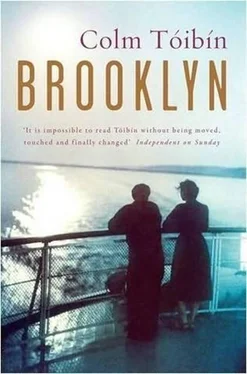The house itself did not seem strange; Eilis noted only its solid, familiar aura, the lingering smell of cooked food, the shadows, the sense of her mother's vivid presence. But nothing had prepared her for the quietness of Rose's bedroom and she felt almost nothing as she stood looking at it. She wondered if her mother wanted her to cry now, or had left the room as it was so she could feel even more deeply Rose's death. She did not know what to say.
"And some day now," her mother said, "we can go through the clothes. Rose had just bought a new winter coat and we'll see if it suits you. She had lovely things."
Eilis suddenly felt immensely tired and thought that she should go to bed once they had eaten breakfast but she knew that her mother had been planning this moment when they would both stand in this doorway together and contemplate the room.
"You know, I sometimes think she's still alive," her mother said. "If I hear the slightest sound upstairs, I often think it must be Rose."
As they ate breakfast Eilis wished she could think of something more to say but it was hard to speak since her mother seemed to have prepared in advance every word that she said.
"I have arranged a wreath to be made specially for you to leave on her grave and we can go out in a few days if the weather keeps up and then we can let them know it's time to put Rose's name and her dates below your father's."
Eilis wondered for a moment what might happen were she to interrupt her mother and say: "I am married." She thought her mother would have a way of not hearing her, or of pretending that she had not spoken. Or else, she imagined, the glass in the window might break.
By the time she managed to say that she was tired and would need to lie down for a while, her mother had not asked her one question about her time in America, or even her trip home. Just as her mother seemed to have prepared things to say and show to her, Eilis had been planning how this first day would go. She had planned to give an account of how much more smooth the crossing from New York to Cobh had been than her first voyage from Liverpool, and how much she had enjoyed sitting up on deck taking in the sun. She had planned also to show her mother the letter from Brooklyn College telling her that she had passed her exams and would, in time, be sent a certificate to say that she was a qualified bookkeeper. She had also bought her mother a cardigan and scarf and some stockings, but her mother had almost absent-mindedly left them aside, saying that she would open them later.
Eilis loved closing the door of her old room and drawing the curtains. All she wanted to do was sleep, even though she had slept well in the hotel in Rosslare Harbour the night before. She had sent Tony a postcard from Cobh saying that she had arrived safely, and had written him a letter from Rosslare describing the journey. She was glad she did not have to write now from her bedroom, which seemed empty of life, which almost frightened her in how little it meant to her. She had put no thought into what it would be like to come home because she had expected that it would be easy; she had longed so much for the familiarity of these rooms that she had presumed she would be happy and relieved to step back into them, but, instead, on this first morning, all she could do was count the days before she went back. This made her feel strange and guilty; she curled up in the bed and closed her eyes in the hope that she might sleep.
Her mother woke her saying it was almost teatime. She had slept, she guessed, for almost six hours and wanted nothing more than to go back to sleep. Her mother told her that there was hot water in case she wanted a bath. She opened her suitcases and began to hang clothes in the wardrobe and store other things in the chest of drawers. She found a summer dress that did not seem to be too wrinkled and a cardigan and clean underwear and a pair of flat shoes.
When she came back into the kitchen, having had her bath and put on the fresh clothes, her mother looked her up and down in vague disapproval. It struck Eilis that maybe the colours she was wearing were too bright, but she did not have any darker colours.
"Now the whole town has been asking for you," her mother said. "God, even Nelly Kelly was asking for you. I saw her standing at the door of the shop and she let a big roar at me. And all your friends want you to call round, but I told them that it would be better to wait until you are settled."
Eilis wondered if her mother had always had this way of speaking that seemed to welcome no reply, and suddenly realized that she had seldom been alone with her before, she had always had Rose to stand between her and her mother, Rose who would have plenty to say to both of them, questions to ask, comments to make and opinions to offer. It must be hard for her mother too, she thought, and it would be best to wait a few days and see if her mother might become interested in her life in America, enough for her slowly to introduce the subject of Tony, enough for her to tell her mother that she was going to marry him when she went back.
They sat at the dining-room table going through all the letters of condolence and mass cards they had received in the weeks after Rose died. Eilis's mother had had a memorial card printed with a photograph of Rose at her most glamorous and happy, giving her name and her age and the date of her death, with short prayers below and on the other side of the card. These had to be sent out. But also, to those who had written letters or those who had visited the house, special notes or longer letters had to be included. Eilis's mother had divided the memorial cards into three piles: one that needed just a name and address on the envelope and a card enclosed, the second requiring a note or a letter from her, and the last needing Eilis to write a note or a letter. Eilis remembered vaguely that this had happened too after her father died, but Rose, she recalled, had taken care of everything and she had not been actively involved.
Her mother knew some of the letters of condolence she had received almost by heart and had also a list of everyone who had called to the house, which she went through slowly for Eilis, remarking on some who had come too often or stayed too long, or others who had gossiped too much or given offence by something they had said. And there were cousins of her mother from out beyond Bree who had brought neighbours of theirs, rough people from out the country, to the house, and she hoped never to lay eyes on either the cousins or their neighbours again.
Then, she said, Dora Devereux from Cush Gap and her sister Statia had come one night and they had never stopped talking, the two of them, with news about people no one else in the room had ever heard of. They had left a mass card each, her mother said, and she would write them a short note thanking them for their visit but trying not to encourage them to call again in a hurry. But Nora Webster had come, she said, with Michael who had taught the boys in school, and they were the nicest people in the whole town. She wouldn't mind, she said, if they came again, but as they had young children she didn't think they would.
As her mother read out lists of other people, Eilis was almost inclined to giggle at names she had not heard of, or thought of, during her time in America. When her mother mentioned an old woman who lived down near the Folly, Eilis could not resist speaking. "God, is she still going?"
Her mother looked sorrowful and put on her glasses again as she began to search for a letter she had mislaid from the captain of the golf club saying what a treasured lady-member Rose had been and how much she would be missed. When she found it, she looked at Eilis severely.
Every letter or note Eilis wrote had to be inspected by her mother, who often wanted it done again or a paragraph added at the end. And in her own letters, as in Eilis's, she wanted it emphasized that, since Eilis was home, she had plenty of company and needed no more visitors.
Читать дальше












